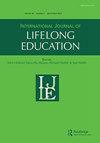Meritocratic lifelong learning: responsibilisation of marginalised adults for their learning as neocolonial contract
IF 1.9
Q2 EDUCATION & EDUCATIONAL RESEARCH
引用次数: 1
Abstract
ABSTRACT After the declaration of lifelong learning as the Sustainable Development Goal 4 in 2015, lifelong learning has become a new policy bandwagon. However, whether investment of time and resources needed for it should be the responsibility of marginalised adults or any other macrolevel institutions has remained elusive. Nested in the larger theoretical and scholarly debate on meritocracy, this paper analyses the World Bank’s policy documents and interviews conducted among Nepali educational policymakers. The key findings of this study suggest that under the neocolonial contract foisted by the World Bank’s policy discourses, marginalised adults are expected to take responsibility for lifelong learning and remain competitive in the global job market. They are blamed for their inability to be competitive because lifelong learning policies are guided by a fallacious discourse of meritocracy. The vision shared by Nepali policymakers shows that lifelong learning can be embedded in the sociocultural contexts of the learners rather than merely guided by meritocratic ideals.精英式终身学习:边缘化成年人对新殖民主义契约学习的责任
摘要自2015年宣布终身学习为可持续发展目标4以来,终身学习已成为一种新的政策潮流。然而,投资所需的时间和资源是否应该由边缘化成年人或任何其他宏观层面的机构负责,仍然难以捉摸。本文嵌套在关于精英政治的更大的理论和学术辩论中,分析了世界银行的政策文件和对尼泊尔教育政策制定者的采访。这项研究的关键发现表明,在世界银行政策话语强加的新殖民主义契约下,被边缘化的成年人有望承担终身学习的责任,并在全球就业市场上保持竞争力。他们被指责没有竞争力,因为终身学习政策是由精英政治的错误言论指导的。尼泊尔政策制定者的共同愿景表明,终身学习可以嵌入学习者的社会文化背景中,而不仅仅是以精英理想为指导。
本文章由计算机程序翻译,如有差异,请以英文原文为准。
求助全文
约1分钟内获得全文
求助全文
来源期刊

International Journal of Lifelong Education
EDUCATION & EDUCATIONAL RESEARCH-
CiteScore
3.10
自引率
27.80%
发文量
40
期刊介绍:
The International Journal of Lifelong Education provides a forum for debate on the principles and practice of lifelong, adult, continuing, recurrent and initial education and learning, whether in formal, institutional or informal settings. Common themes include social purpose in lifelong education, and sociological, policy and political studies of lifelong education. The journal recognises that research into lifelong learning needs to focus on the relationships between schooling, later learning, active citizenship and personal fulfilment, as well as the relationship between schooling, employability and economic development.
 求助内容:
求助内容: 应助结果提醒方式:
应助结果提醒方式:


